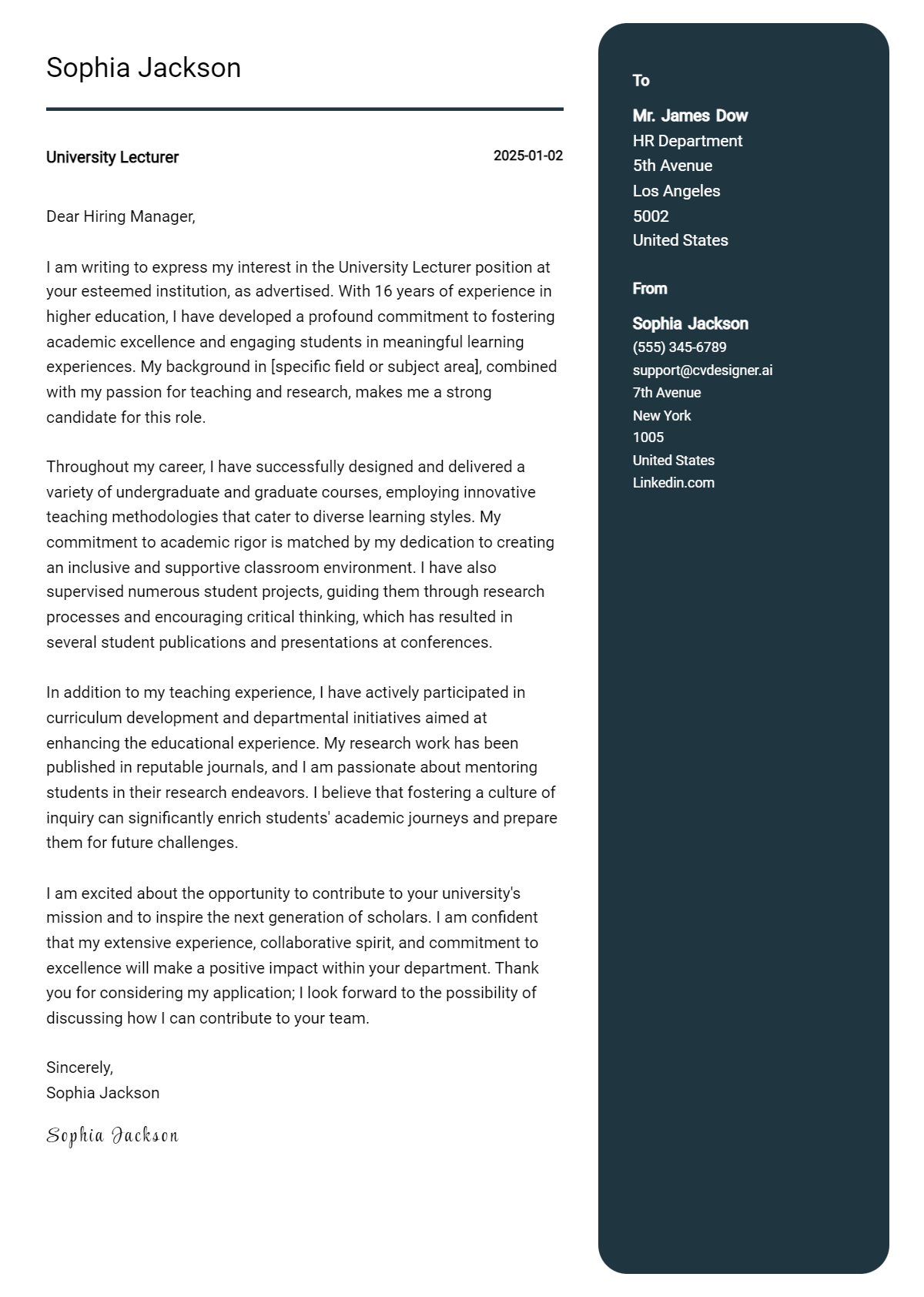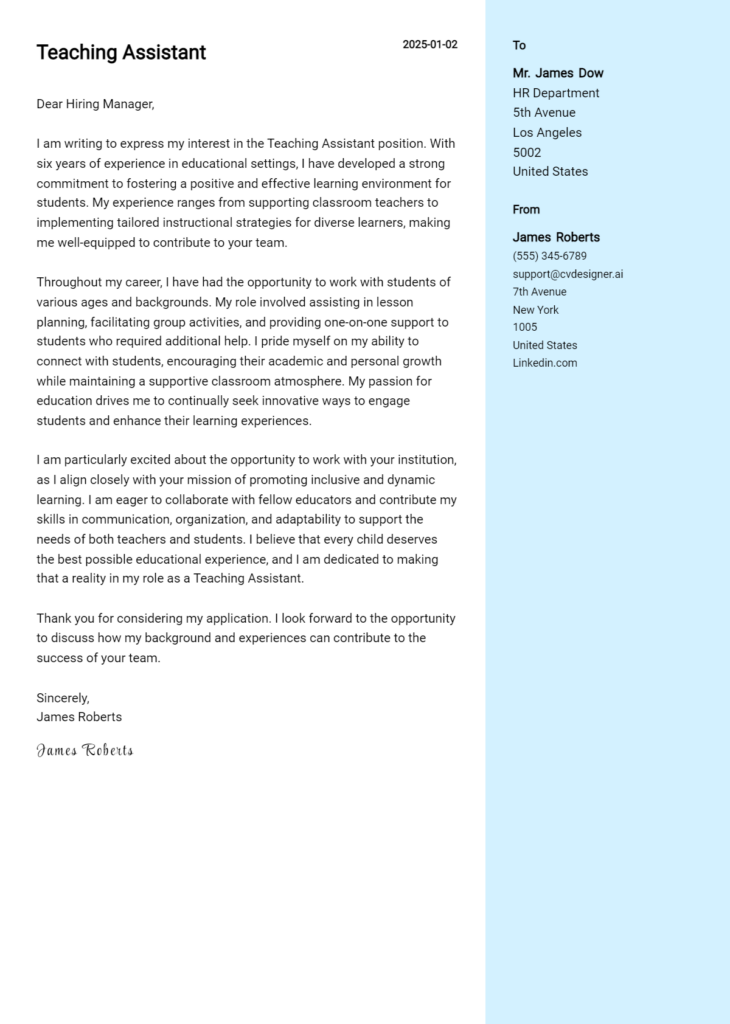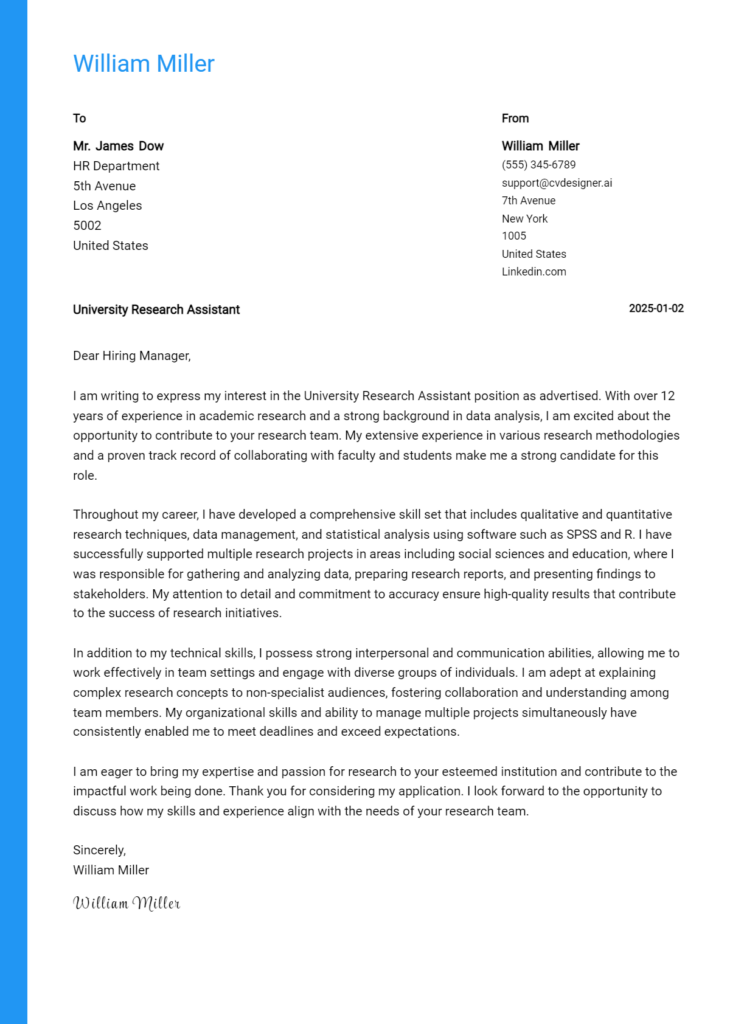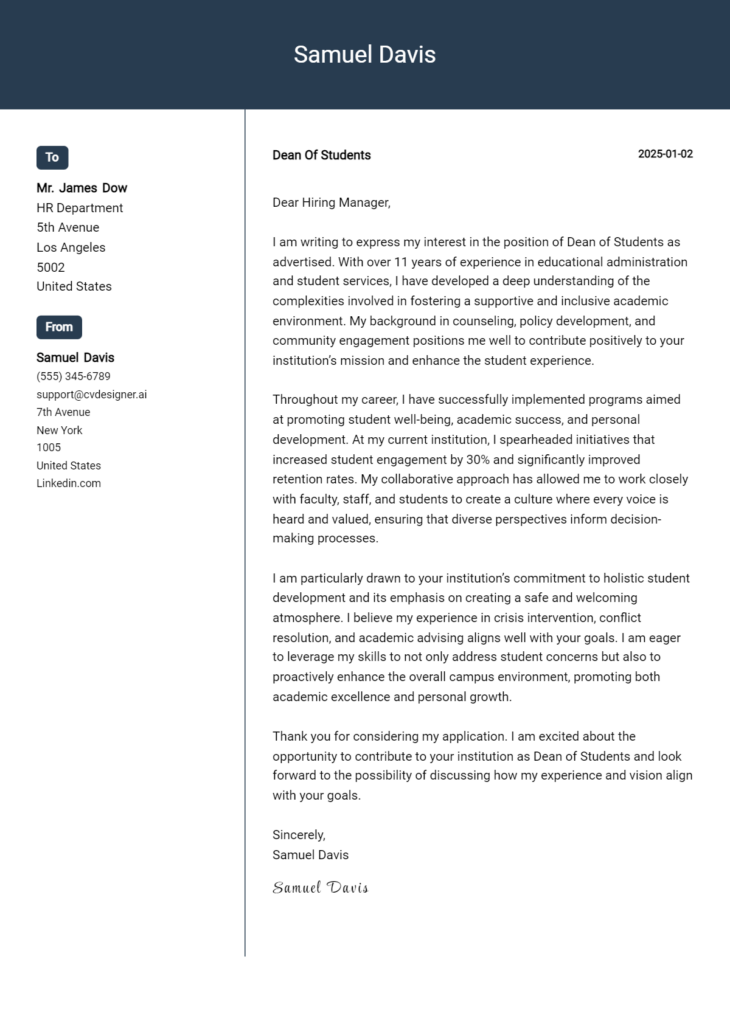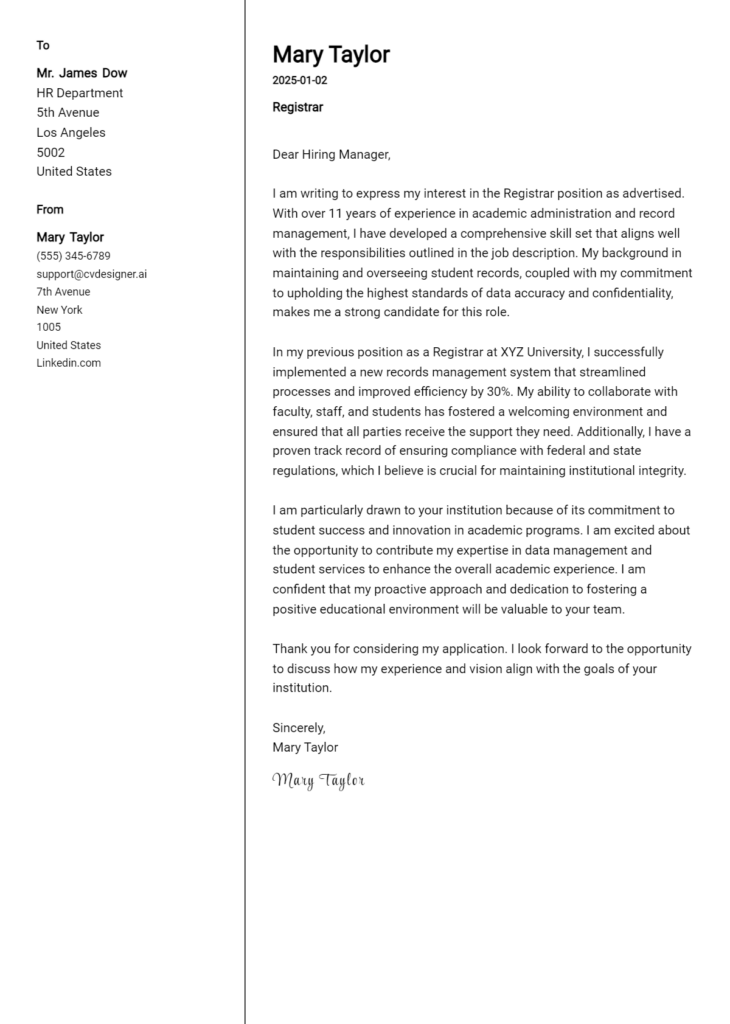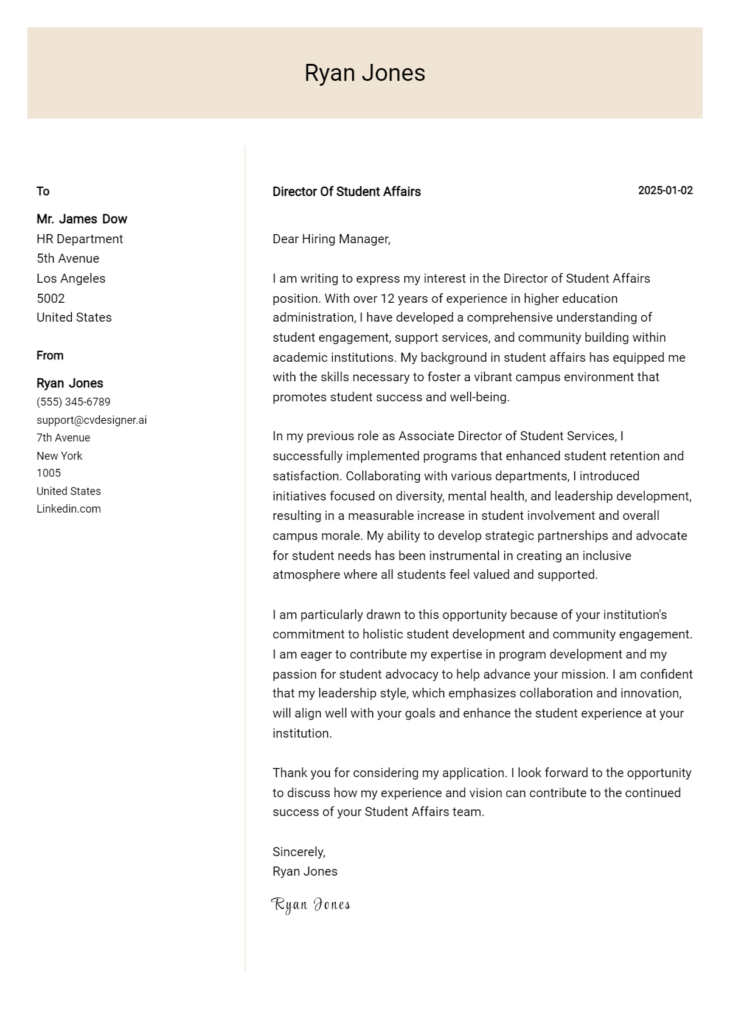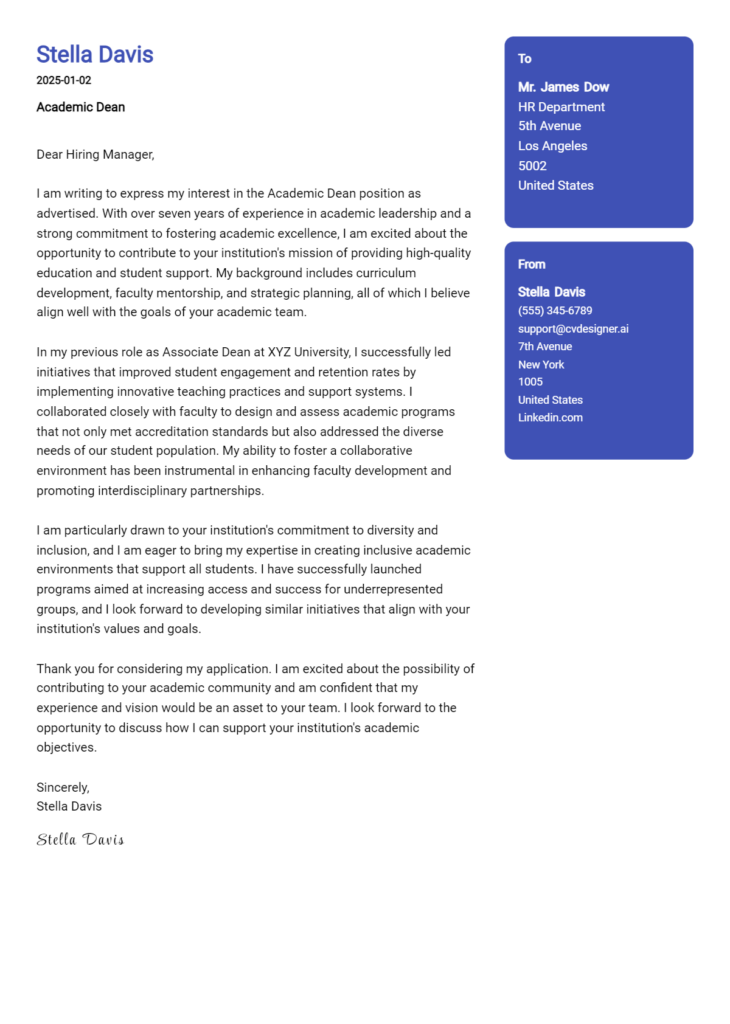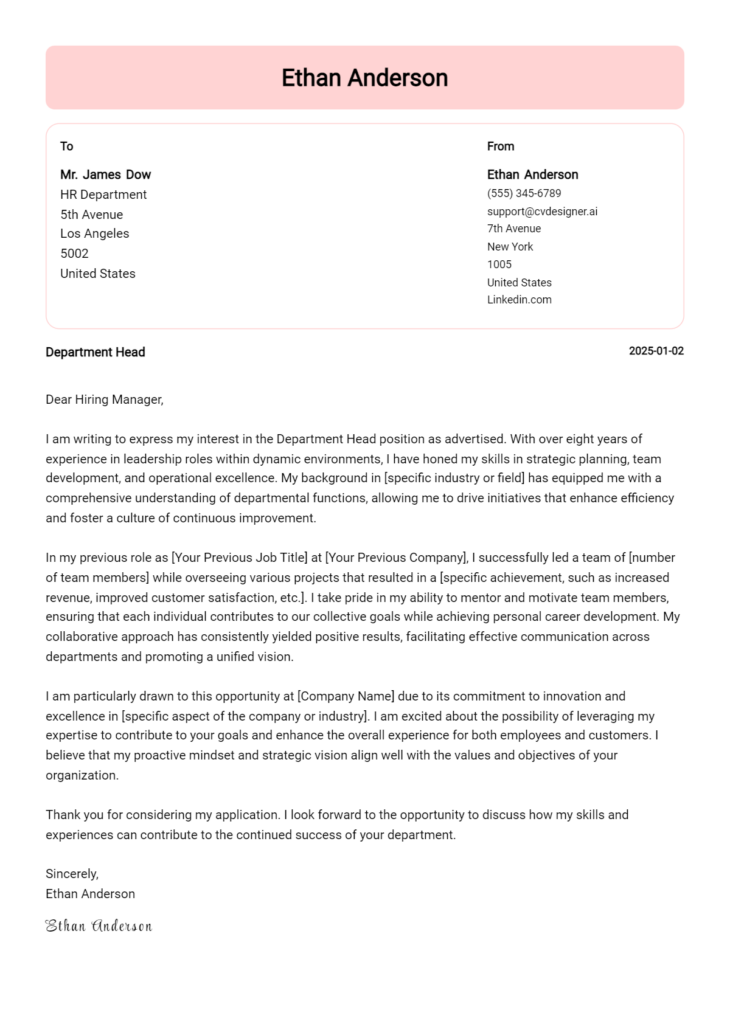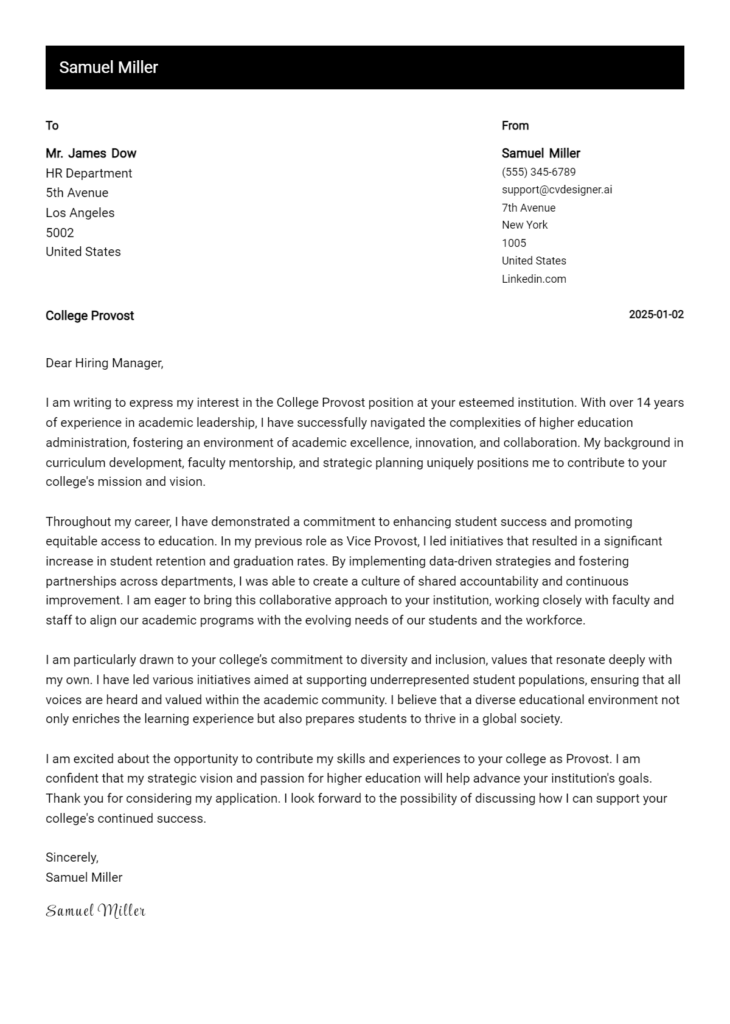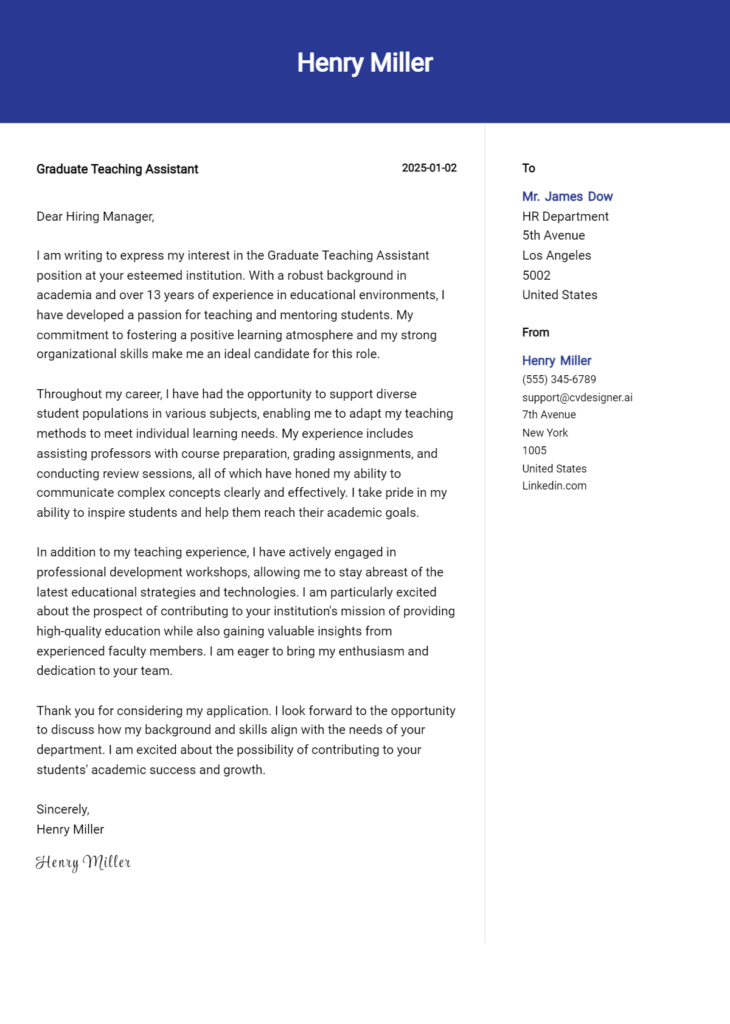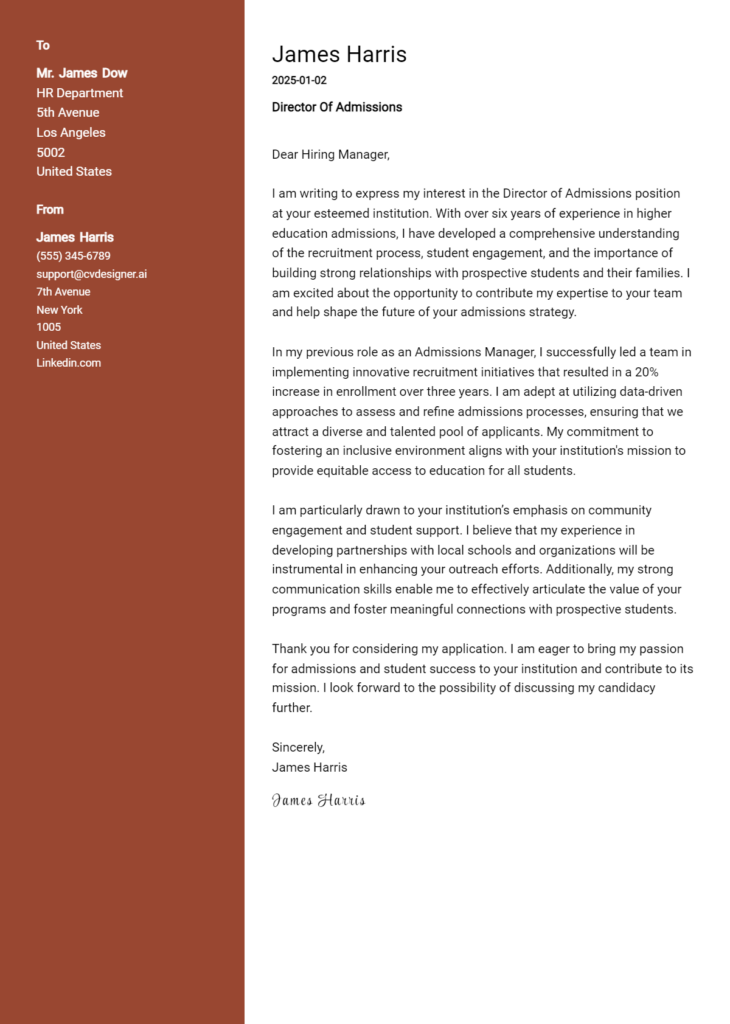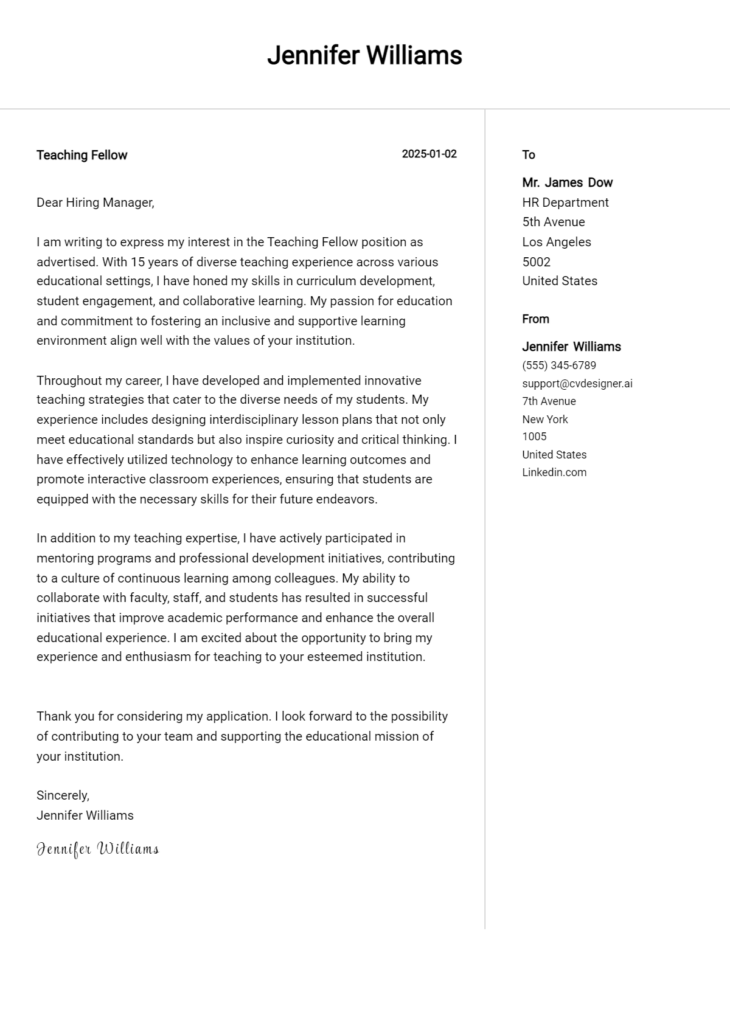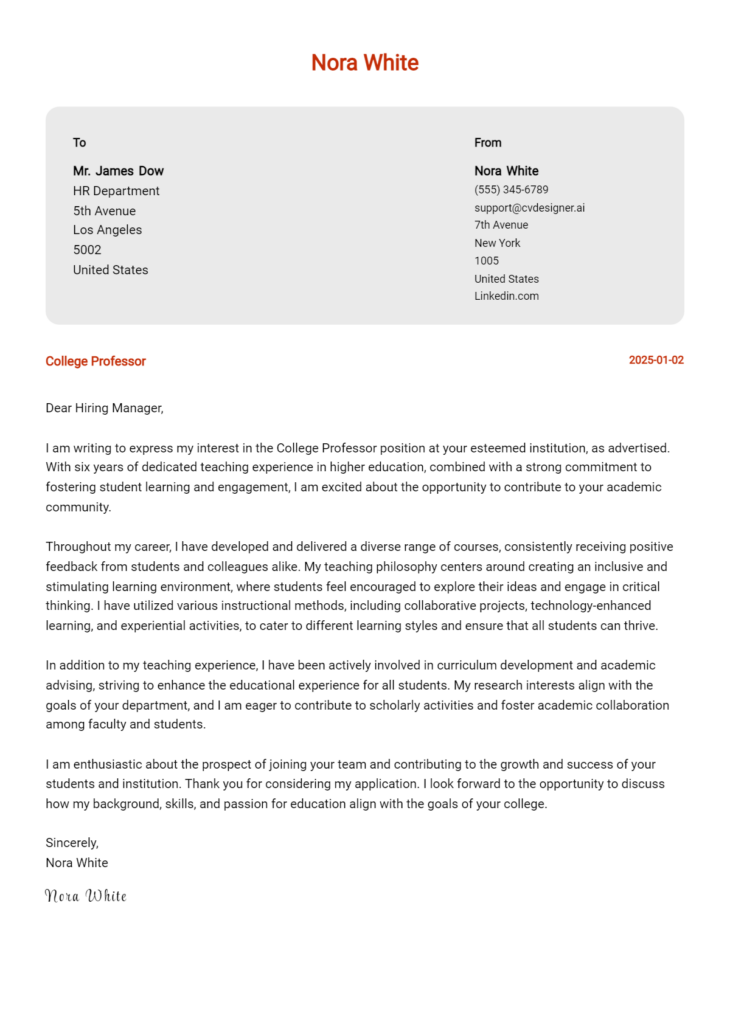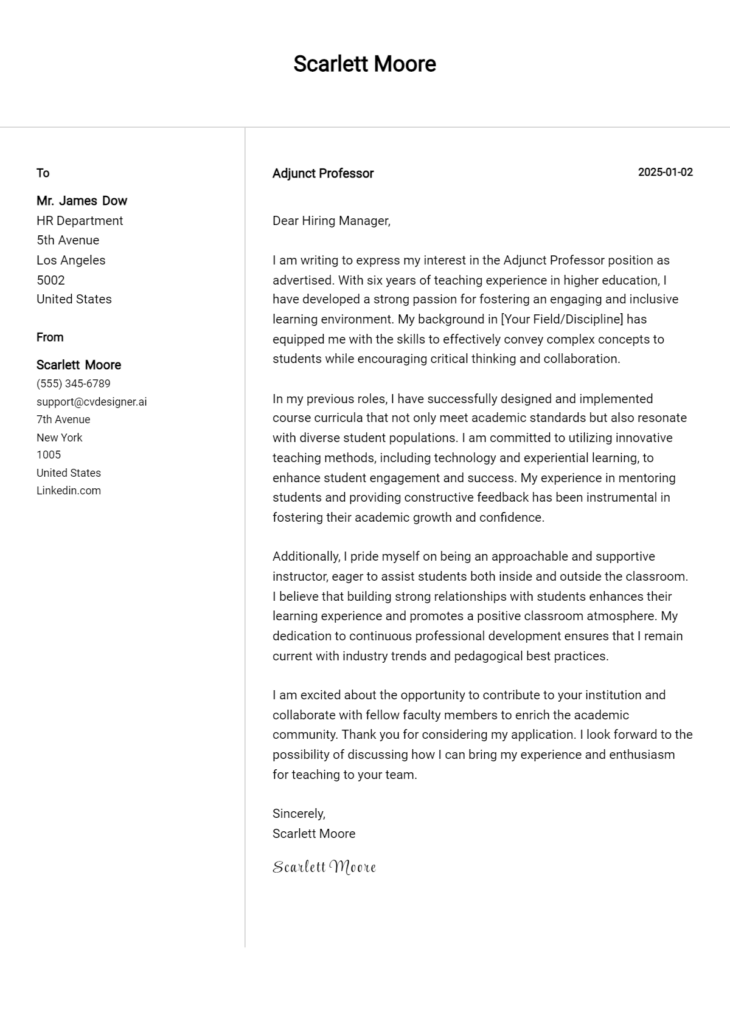University Lecturer Cover Letter Examples
Explore additional University Lecturer cover letter samples and guides and see what works for your level of experience or role.
How to Format a University Lecturer Cover Letter?
Crafting a compelling cover letter is essential for university lecturers, as it serves as an introduction to your academic credentials and teaching philosophy. The format you choose not only reflects your professionalism but also showcases your ability to communicate effectively—an essential skill in academia. By presenting your qualifications in a clear, structured manner, you make it easier for hiring committees to assess your fit for the role and appreciate your commitment to education.
In this guide, we'll outline how to structure your cover letter, providing insights and examples tailored for university lecturers to help you create a persuasive document.
We'll focus on the essential components of a professional cover letter, including:
- Cover Letter Header
- Cover Letter Greeting
- Cover Letter Introduction
- Cover Letter Body
- Cover Letter Closing
Each section plays a crucial role in emphasizing your qualifications and dedication to teaching. Let’s delve into each part and explore how to make your university lecturer cover letter shine.
The Importance of a Cover Letter Header for a University Lecturer
The cover letter header is a crucial component of any application for a university lecturer position, as it sets the tone for the entire document. A well-structured header not only provides essential information but also reflects the professionalism and clarity that academic institutions value. It should include the applicant's contact information, the date of submission, and the recipient's details, ensuring that the reader can easily identify the sender and the context of the application. A strong header presents this information in a clear and organized manner, while a weak header can create confusion and diminish the overall impression of the application.
Strong Example
Dr. Jane Smith 123 Academic Lane University Town, ST 12345 jane.smith@email.com (123) 456-7890 October 10, 2023 Dr. John Doe Department of English University of Learning 456 University Ave College City, ST 67890
Weak Example
Jane Smith 123 Academic Lane (123) 456-7890 October 10, 2023 To Whom It May Concern
The Importance of the Cover Letter Greeting
The greeting of your cover letter plays a crucial role in setting the tone for the rest of your application. A well-crafted greeting not only demonstrates professionalism but also adds a personal touch by directly addressing the hiring manager. This personalization can help create a connection and make your application stand out among a sea of generic submissions. To enhance your greeting, avoid using overly generic terms like "To Whom It May Concern." Instead, take the time to research the name of the hiring manager or the head of the department. This small effort can reflect your genuine interest in the position and institution.
Strong Greeting Example
Dear Dr. Smith,
Weak Greeting Example
To Whom It May Concern,
The Importance of a Well-Crafted Cover Letter Introduction for a University Lecturer
A well-crafted cover letter introduction is crucial for a University Lecturer position, as it serves as the first impression to the hiring committee. This introductory paragraph should capture the attention of the hiring manager, expressing genuine interest in the role while briefly highlighting key skills or noteworthy achievements that set the candidate apart. An engaging start can pique curiosity, encouraging the reader to delve deeper into the application, while a lackluster introduction may lead to missed opportunities. Below are examples of strong and weak introductions to illustrate the difference.
Strong Example
Dear [Hiring Manager's Name], I am excited to apply for the University Lecturer position in the Department of Psychology at [University Name]. With over a decade of teaching experience, coupled with my research on cognitive behavioral therapy, I am passionate about fostering an engaging learning environment that not only imparts knowledge but also inspires students to explore their potential. My commitment to student success is reflected in my consistently high student evaluation scores and my curriculum development initiatives that have significantly improved course outcomes.
Weak Example
Dear [Hiring Manager's Name], I am writing to apply for the University Lecturer position. I have a degree in Psychology and some teaching experience. I believe I would be a good fit for the role and would like to share my qualifications.
Purpose of the Cover Letter Body for a University Lecturer
The body of a cover letter for a University Lecturer serves as a crucial platform for candidates to articulate their professional journey, highlighting their academic qualifications, teaching philosophy, and research accomplishments. It provides an opportunity to showcase specific projects or experiences that demonstrate the candidate's expertise and their potential contribution to the university. By elaborating on relevant teaching methodologies, innovative course designs, or impactful research initiatives, candidates can effectively communicate their value to the institution. This section is essential in establishing a connection between the candidate's qualifications and the university's goals, ultimately persuading the hiring committee of their fit for the position.
Strong Example
Dear Hiring Committee, I am excited to apply for the University Lecturer position in the Department of Environmental Science at XYZ University. With over five years of teaching experience at ABC University, I developed a course on sustainable practices that increased student engagement by 40%, as evidenced by course evaluations. Additionally, my research on renewable energy solutions, published in the Journal of Environmental Research, has contributed to ongoing projects aimed at reducing carbon footprints in urban areas. I am eager to bring my commitment to student success and innovative teaching strategies to your esteemed institution, fostering a collaborative environment that encourages critical thinking and real-world application of environmental science.
Weak Example
Dear Hiring Committee, I am applying for the position of University Lecturer. I have worked at a university before and have taught some classes. I think I can be a good fit for your university. I have also done some research, but I don't remember the details. I hope you consider my application. Best regards, John Doe
The Importance of the Cover Letter Closing for a University Lecturer
The closing paragraph of a cover letter is crucial for a University Lecturer as it serves as the final opportunity to leave a lasting impression. It should succinctly summarize qualifications, reiterate enthusiasm for the role, and encourage the hiring committee to take the next step, whether that be reviewing the resume or scheduling an interview. A strong closing can reinforce the candidate's fit for the position and express eagerness to contribute to the academic community, while a weak closing may leave a lackluster impression, failing to prompt further engagement.
Strong Example
Thank you for considering my application for the University Lecturer position. With my extensive experience in curriculum development and a passion for mentoring students, I am excited about the opportunity to contribute to your esteemed department. I look forward to the possibility of discussing my application further and am eager to share how my background aligns with the goals of your institution. Please feel free to contact me to schedule an interview at your convenience.
Weak Example
Thanks for reading my letter. I hope you look at my resume. I guess we might talk later if you decide to call me.
Crafting a compelling cover letter is crucial for candidates seeking a University Lecturer position. This document serves as your first impression and an opportunity to highlight not only your academic qualifications but also your technical skills, problem-solving abilities, knowledge of the Software Development Life Cycle (SDLC), teamwork experiences, and a genuine passion for continuous learning. Below are some tips to help you create an effective cover letter that stands out among other applicants.
Tips for Writing a Cover Letter for University Lecturer
Highlight Your Technical Skills
Clearly articulate your technical expertise relevant to the subject you will be teaching. Mention specific programming languages, software tools, or methodologies you are proficient in. This showcases your ability to integrate technology into your teaching and research, which is a vital aspect in today’s academic environment.Demonstrate Problem-Solving Abilities
Incorporate examples that illustrate your problem-solving skills. Discuss a challenging situation you faced in your teaching or research and how you addressed it. This not only emphasizes your critical thinking skills but also your capability to inspire students to tackle complex problems.Showcase Your Knowledge of SDLC
If applicable to your discipline, explain your understanding of the Software Development Life Cycle and how it relates to your field. Discuss any projects or coursework where you applied SDLC principles, as this knowledge indicates your readiness to prepare students for industry standards.Emphasize Teamwork and Collaboration
Share experiences where you collaborated with colleagues on research projects or curriculum development. Highlight your ability to work effectively in a team, as universities often value collaborative work environments. This can also include mentoring roles, which demonstrate your commitment to fostering a supportive academic community.Express Your Passion for Continuous Learning
Convey your enthusiasm for professional development and lifelong learning. Mention any recent courses, conferences, or workshops you have attended that relate to your field. This demonstrates your commitment to staying current in your discipline and your dedication to enriching the academic experience for your students.
By incorporating these elements into your cover letter, you can present a well-rounded application that showcases your qualifications and enthusiasm for the University Lecturer role. For additional resources, consider exploring various cover letter templates or using a cover letter builder to enhance your writing process.
Common Mistakes to Avoid in a University Lecturer Cover Letter
Avoiding common mistakes in your cover letter is crucial for standing out in the competitive field of academia. A well-crafted cover letter can significantly improve your chances of securing an interview. Here are some common pitfalls to watch out for:
Generic Content: Using a one-size-fits-all approach can turn off hiring committees. Tailor your letter to the specific university and department. Research their values and align your experiences accordingly.
Neglecting Formatting: Poor formatting can detract from your professionalism. Ensure your cover letter follows a clear cover letter format that enhances readability and presents your information cohesively.
Lack of Specific Examples: Failing to provide concrete examples of your teaching and research experience can weaken your application. Use specific achievements to demonstrate your impact in previous roles.
Overly Formal Language: While professionalism is important, overly formal language can make your cover letter sound stiff. Aim for a conversational tone that reflects your personality while maintaining professionalism.
Ignoring the Call to Action: Forgetting to express your enthusiasm for the position and indicating your desire for an interview can lead to a lack of engagement. Always conclude with a proactive statement encouraging a follow-up.
Typos and Grammatical Errors: Errors in your cover letter can give a poor impression of your attention to detail. Proofread carefully or ask a colleague to review your letter before submission.
Excessive Length: A cover letter that is too long can lose the reader's interest. Aim for a concise letter, ideally one page, and focus on the most relevant information.
For more help, consider reviewing cover letter examples to inspire your writing and ensure your letter stands out for all the right reasons.
Cover Letter FAQs for University Lecturer
What should I include in my cover letter for a university lecturer position?
Your cover letter should include your academic qualifications, teaching philosophy, and relevant experience. Start with a brief introduction that states the position you're applying for and where you found the listing. Highlight your educational background, including degrees and any certifications. Discuss your teaching experience, methodologies, and any innovative practices you've implemented. Additionally, mention any research projects, publications, or grants that illustrate your scholarly contributions. Lastly, express your enthusiasm for the role and how you align with the university's values and mission.
How do I tailor my cover letter for a specific university?
To tailor your cover letter, research the specific university's values, teaching culture, and existing programs. Mention the university by name and reference specific aspects that resonate with you, such as their commitment to diversity or innovative teaching strategies. Align your teaching philosophy with their mission statement, and highlight any relevant experience that demonstrates your fit within their community. If you have connections to faculty or research groups within the university, mention those as well. A personalized cover letter shows that you are genuinely interested in the position and have taken the time to understand the institution.
How long should my cover letter be?
Your cover letter should ideally be one page long, consisting of three to four paragraphs. Aim for around 250 to 400 words. This length allows you to present your qualifications and experiences concisely while providing enough detail to engage the reader. Start with an introduction, followed by a middle section that details your teaching and research experience, and conclude with a strong closing statement expressing your enthusiasm for the role. Avoid overly lengthy descriptions; instead, focus on the most relevant achievements and how they relate to the position you're applying for.
Should I address my cover letter to a specific person?
Yes, addressing your cover letter to a specific person, such as the hiring committee chair or department head, is highly recommended. This approach demonstrates professionalism and shows that you have done your research. If the job listing does not specify a name, check the university's website or call the department to inquire. Using a specific name personalizes your application and makes it stand out. In cases where no name can be found, "Dear Hiring Committee" is an acceptable alternative, but it is less effective than a personalized greeting.
Build your Cover Letter in minutes
Use an AI-powered cover letter builder and have your letter done in 5 minutes. Just select your template and our software will guide you through the process.

